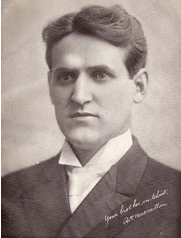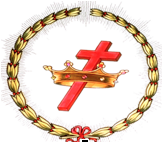
Alexander Hugh Macmillan
1877-1966
Information listed below is provided for historial research purposes.

Macmillan was born in Canada. He relocated to Boston. In 1897, he received a copy of "The Plan of the Ages," written by Charles Taze Russell. He later obtained a copy of "The Time Is At Hand." After reading these books, he became a stanch believer in the bible student movement. In 1900 he met Pastor Russell. He was baptised and subsequently became a traveling pilgrim, spreading the Gospel in Massachusetts. In 1901 he attended a convention in Cleveland, Ohio. Pastor Russell asked him to join the Watch Tower Society's staff in Allegheny, New York. He traveled extensively with Pastor Russell. After Pastor Russell's death, Menta Sturgeon wired his wife at the Brooklyn Bethel home that Pastor Russell had died. MacMillan received the telegram and instead of giving it to Mrs. Sturgeon, wired J. F. Rutherford, that “The old man is dead." He proved loyal to Judge Rutherford in the strife which insued and remained with the organization which became known as Jehovah's Witnesses.
Exerpts from the book "Faith on the March," written by A. H. Macmillan in 1957.
"Next summer saw the turn of the century and I met Pastor Russell. It was at a convention in Philadelphia. June 17 was Bunker Hill day in Massachusetts and, of course, a holiday. There were special train rates to Philadelphia at that time because the Republican party was also holding a convention there. That year they nominated William McKinley as president and Theodore Roosevelt vice-president of the United States. So I took advantage of the holiday and special rates and went to the Bible students' convention sponsored by the Watch Tower Bible and Tract Society. There, as I now recall, Russell talked to the public on the subject, "Salvation from what, to what?" The theme of his discourse was that men are not saved from eternal torment, which does not exist. They are saved from eternal death to everlasting life. After the talk I was delighted to meet the speaker. He was an extremely kind man. I was just about the only young person there. All others present seemed mature in years. His willingness to talk to me impressed me greatly, because I knew of no man of his importance on the public platform who would talk face to face with young people from his audience after his lectures. I recall that in Boston Dwight L. Moody would leave the hall immediately after his sermons and go to his hotel nearby. Anyone who desired to ask questions would have to go to others of Moody's party. But C. T. Russell always made himself personally available to anyone who wished to talk to him."
"On August 23, 1914, as I well recall, Pastor Russell started on a trip to the Northwest, down the Pacific coast and over into the Southern states, and then ending at Saratoga Springs, New York, where we held a convention September 27- 30. That was a highly interesting time because a few of us seriously thought we were going to heaven during the first week of that October. At that Saratoga Springs convention quite a number were in attendance. Wednesday (September 30) I was invited to talk on the subject, "The End of All Things Is at Hand; Therefore Let Us Be Sober, Watchful and Pray." Well, as one would say, that was down my road. I believed it myself sincerely--that the church was "going home" in October."
"During that discourse I made this unfortunate remark: "This is probably the last public address I shall ever deliver because we shall be going home soon." Next morning (October I ) about five hundred of us began the return trip to Brooklyn, including a lovely ride on the Hudson River Day Line steamer from Albany to New York. Sunday morning we were to open services in Brooklyn, this to conclude our convention. Quite a number of the conventioners stayed at Bethel, the home of the headquarters staff members. Friday morning (October 2) we all were seated at the breakfast table when Russell came down. As he entered the room he hesitated a moment as was his custom and said cheerily, "Good morning all." But this morning, instead of proceeding to his seat as usual, he briskly clapped his hands and happily announced: "The Gentile times have ended; their kings have had their day." We all applauded."
"OCTOBER 31----Charles Taze Russell, pastor of the Brooklyn Tabernacle, and known all over the country as "Pastor Russell," died from heart disease at 2:30 o'clock this afternoon on an Atchison, Topeka Santa Fe train, en route from Los Angeles to New York. He complained of feeling ill after leaving Los Angeles, hissecretary said, and gradually grew worse. The end came while the train was stopped at Pampa, Texas.
At seven o'clock the next morning (November 1 ). I entered Bethel dining room with a telegram just delivered. Members of the family were all seated in their customary manner and did not know anything about Russell's serious illness or death. I read them the telegram and a moan went up all over that dining room. Some wept audibly. None ate breakfast that morning. All were greatly upset.
At the end of the meal period they met in little groups to talk and whisper, "What is going to happen now?" Little work was done that day. We did not know what to do. It was so unexpected, and yet Russell had tried to prepare us for it. What would we do?
The first shock of our loss of C.T. Russell was the worst. For those first few days our future was a blank wall. Throughout his life Russell had been "the Society." The work centered around his dynamic determination to see God's will done. He had been a man of action. He had never had any sympathy for those merely looking to go to heaven. To him, worship of God was to expend himself in service to God, and that he had truly done. So he did not stop preaching because 1914 did not bring all that had originally been hoped for. He died as he had lived--happy in his work of preaching the Word.
We had no real organization. There had seemed no need for it. Russell had learned through many hurtsome experiences that few men could be trusted with serious responsibility. Since his prime objective was to do the harvest work, he was for getting it done before 1914 would (as he had thought until just before his death) bring an end to it. Then, as the date approached, he realized more and more that there was a far greater work to be done than the few remaining years--then months-would allow for. So with the waning of his own physical powers he had made an effort to strengthen the Society as best he could in order to keep things moving."
"After his funeral we returned to Bethel and began to study again. The more we studied the more determined we became to keep going in the work. One thing we knew we still had. That was something no man could take from us. It was the truth of God's Word. We had truly been "called out of darkness into God's marvelous light" and were constantly more determined to give Jehovah praise for that enlightened understanding. How much more truth we were to receive or how we were to receive it we did not know. We did not then see how anyone else could be used as Russell had been. He had written six volumes of Studies in the Scriptures, and we had always expected a seventh. Almost as he died Russell had said reassuringly, "Don't worry, the Lord will take care of it." We were willing to wait and see."
- "Faith on the March"
- A. H. Macmillion Delivers a Lecture, St. Johnsbury Caledonian, 05 April 1911
